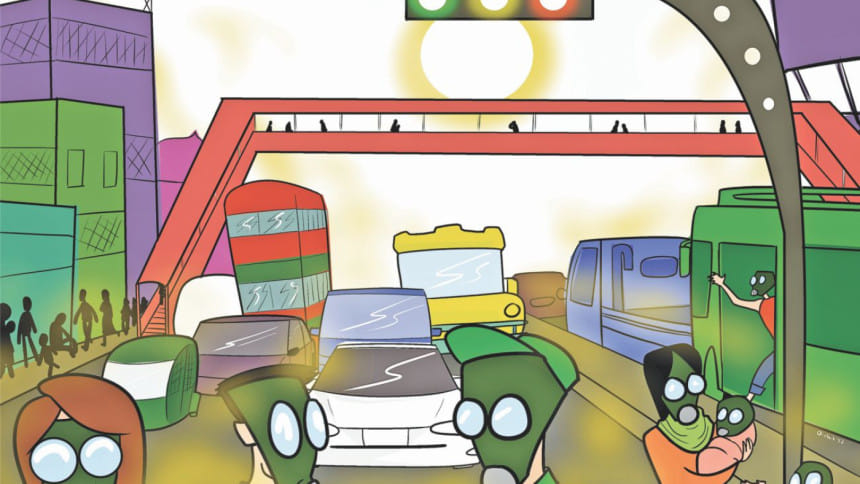That sweet Dhaka air

I tried breathing in Dhaka and honestly, if you haven't tried it yourself, I can't recommend it to you. It's a waste of your time—simply the worst.
Hanging around outside is an awful idea because, firstly, the dust. Hanging around inside is also a bad idea because of all the dust on the floor and all over your stuff. You can't keep it out. I mean, I suppose you can live with your windows shut all the time, but if you're anything like me, you can stand just about 20 straight hours of your own accumulated body smell. Any more and you'll crave the sweet, cloying, choking sensation brought to us by the rapidly accelerating economic growth of our city.
Why is it exactly that all these construction sites leave all that sand on the footpaths? That's not what they're for. I don't think any civic planner ever woke up in the morning excited to lay out some new areas designed to keep several hundred tons of grey dirt lying around for months on end. (This might just be because no civic planner has ever woken up excited.) If you're a real estate mogul, please just grab all your sand and throw it into the construction site where it belongs. Just store it all in the water tank until the building's ready, it's not like it'll make a difference to the quality of what your tenants end up drinking anyway.
It's not just the private sector that's to blame, of course. We've all seen the massive projects of infrastructural improvement that mostly seem to involve digging up roads, which, if not perfectly good, were at least markedly superior to big holes in the ground. Big holes in the ground are bad for inner-city transport and produce large quantities of dust, in addition to the large quantities of sand piled neatly along these holes. We all had a good breathe on those, I can tell you.
I generally can't see the buildings on the other end of the road anymore. Some will say it is fog and speak romantically of it. They are wrong and silly. It is mostly dust, which, mixed with what fog there is, transforms into a little something we call lung cancer. Respiratory illnesses are very much on the rise, which just adds to the potent mix of heart trouble, diabetes and food poisoning we've ordinarily had to contend with.
One can't really give all the credit to the dust and sandy dunes parked along what remains of the roads, of course. A huge part of the credit goes to the roughly 1,030,864 registered vehicles chugging along between the sandy stretches, trying to avoid the big holes in the ground. At least they wish they could chug along—more often than not, the powers-that-be have other plans. It turns out that 1,030,864 vehicles can't do a whole lot when a lot of the road network is physically unusable at any given time, when the traffic lights aren't worth their weight in metal, the traffic police are generally angry because of all the sunshine and dust and bad pay, and the general approach to traffic management in the case of events is to simply shut the roads down. Guzzling out gas from unfiltered exhaust pipes, there they sit, all these private cars and pockmarked buses and trucks piled high with—quite probably—more sand. The bouquet of motor emissions wafting up from this sedentary mass stews and broils and makes a truly fantastic addition to the foggy, dusty air. It does make for some excellent sunsets and night-time photography, though.
Think and breathe deep as you while away the hours in traffic, horns blaring all around you for no discernible reason. If you can afford to keep the air conditioner running, there's no good reason not to—once upon a time the “real” air outside could have been called fresh and character-building. However, life-threatening illnesses aren't an essential part of anyone's upbringing. Exercise your bourgeois privilege and lead the marginally healthier life the rest of us can only dream of.
What is to be done? Some would say we need to radically restructure our urban planning. Decentralise the government and disperse the institutions across the country. Reduce the number of vehicles on the road and improve public transport. Enforce safe, environmentally-responsible construction practices. Put more money on healthcare and run awareness campaigns on the importance of fresh air. Import large quantities of gas masks—those flimsy things over your face don't really do much. All of these are good ideas, which means they will not be happening in our lifetimes.
We've been breathing for the past four billion years or so, and it's probably time we moved onto something new. Evolution works unusually quickly under pressure and Dhaka life is definitely arranging matters such that respiration is not only superfluous, but actively harmful. Dhaka-dwellers could well go down in the fossil record one of the first mammals to have switched their physiologies to a completely alternate form of energy obtainment. Perhaps we will subsist on casual misogyny instead.
Zoheb Mashiur is an artist and an MA student at Kent University's Brussels School of International Studies.

 For all latest news, follow The Daily Star's Google News channel.
For all latest news, follow The Daily Star's Google News channel. 



Comments